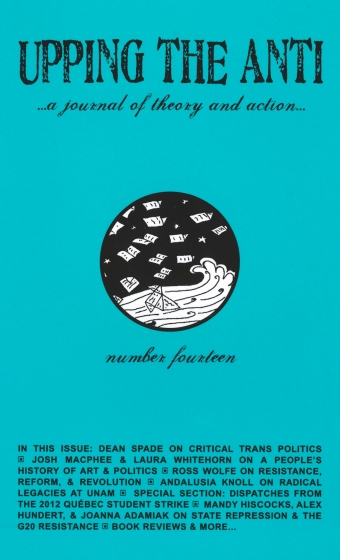The Law's Fundamentally Violent Character
Dear UTA,
As a radical lawyer and legal scholar with over a decade of experience in activist legal defense (and – full disclosure – as a former Upping the Anti Advisory Board member), I eagerly awaited your last editorial. However, despite its historical breadth, “The Courtroom and the Street: Notes on Activist Encounters With the Law” largely fails to make a meaningful contribution to the development of praxis with respect to law, resistance, and the state.
On a theoretical level, the choice of sovereignty as an organizing concept results in an unnecessarily opaque lens through which to address this problematic. Although the editorial’s depiction of the role of law in the “founding moment” of Canadian sovereignty is both a crucial reminder and robustly argued, framing political struggle as an “emergent contest of sovereignties” is to deny what Peter Nyers describes as the “profound and inescapable paradox” of such moments, given that “the founding of any sovereign order involves practices that are both violent and arbitrary.” Particularly outside the context of Indigenous struggles (to the degree that there is an “outside”), it is not clear where this focus on sovereignty leads. Aside from brief allusions to a “post-legal order” (and, rather inaccurately, to law as “suprahistorical”), there is no indication as to whether new/different/multiple sovereignties are to be understood as post-revolutionary orders. What kind of sovereignty is intended to usurp the existing one(s)? Given that a major cleavage in the radical left centres on orientation toward state power (most crudely expressed in anarchist vs. socialist dichotomies), invocation of sovereignty, particularly as both a legal phenomenon and a political outcome or goal, ought to be more transparent.
Further, UTA fails to engage with the activist-scholars of the Third World Approaches to International Law (TWAIL) and critical race theory movements or the work of Marxist legal theorists charting the contemporaneous emergence of law, capitalism, and colonialism. These schools of thought are hardly homogenous, but they have sharpened the Left’s ability to critique liberal legal frameworks seemingly committed to norms of equality, global justice, and the rule of law. The most robust of such analyses are particularly relevant to this editorial, as they point to an understanding that law – in form and substance – is inextricably bound up with the commodity form of exchange domestically, while sovereignty reproduces this relationship of formal equality between nation states globally, producing an unequal international order marked by imperialism. This is why (contrary to E.P. Thompson and others) China Miéville concludes that the “chaotic and bloody world around us is the rule of law” and why a “fundamental reformulation” of its political economy would require the end of law.
Turning to questions of organization, UTA makes the startling claim that “we rarely talk about the law as such. Still less are we able to easily reconcile our healthy contempt for the law with the significant legal claims underlying many contemporary struggles.” Such an overstatement not only obfuscates the work of activist law collectives and radical lawyers (including those organizing in the US-based National Lawyers Guild and locally in the Law Union of Ontario), but, more crucially, demonstrates a profound disconnect from the very movements UTA aims to engage. For example, debates within various Occupy movements on questions of (il)legality, property rights, the repressive power of the state, and the like are far more nuanced than you claim (although there is, of course, much room for the development of sophisticated, radical legal analyses and practices, especially with respect to reliance on constitutional and human rights claims). Again, reducing the terrain of struggle by counterposing disavowal of “law” with seemingly hegemonic sovereign power means leaving no room for contestation, much less for counter-hegemonic projects that stop short of – or even eschew – taking state power. Despite the reliance on Lukács, the editorial does little to seriously advance a strategic relationship with law in the current moment, reducing strategy to a tactic – the demonstration – while simultaneously and paradoxically dismissing and reifying other avenues of resistance, particularly community organizing. We can certainly agree that it is “crucial that we understand what the law is and – equally important – what a ‘community’ must become in order to effectively displace it,” but even in the most generous reading of your emphasis on “sovereign contestation,” placing the word community in quotes seems more nihilistic than strategic.
This orientation is all the more disconcerting given that “The Courtroom and the Street” opens with an ode to Jaggi Singh’s guilty plea in the conspiracy case arising out of the mobilization against the Toronto G20 summit. UTA argues that Singh’s comments rejecting the courtroom as a site of movement decision-making “affirmed the activists’ resilience,” yet you wind up highlighting the actions of a single defendant among 1100 arrestees, actions which arguably gave rise to complex questions of accountability, solidarity, and yes, strategy. But recognizing that Singh’s decision was a strategic one does not excuse UTA’s claim that it is “impossible to evaluate,” especially given that you go on to valorize others’ decisions (in other cases) to take criminal charges to trial! Relying on the conclusions of Crimethinc (again, ignoring the contributions of radical legal organizations), the editorial blithely concludes that “[c]harges that could lead to jail time don’t always stick and activists are better off fighting the rap.” Given that the issue of UTA in which this letter will appear also includes interviews with two of Singh’s co-accused, Mandy Hiscocks and Alex Hundert (sentenced to 16 and 13.5 months in prison, respectively), I don’t think I need to explain why such a claim is at best presumptuous and at worst irresponsible and deeply unstrategic.
In solidarity,
Irina Ceric
Toronto, ON

